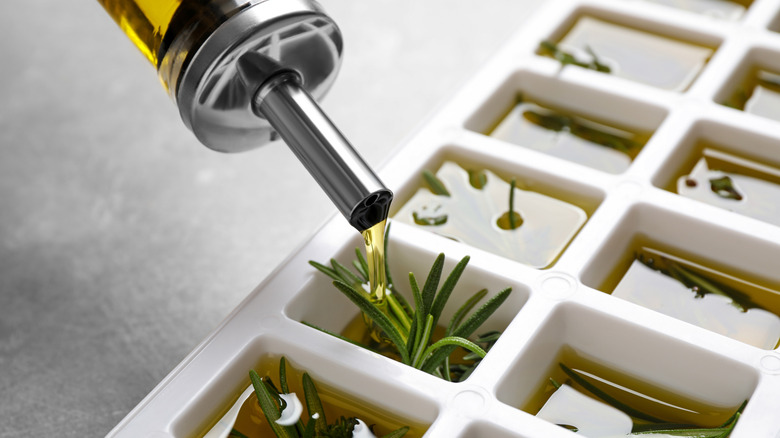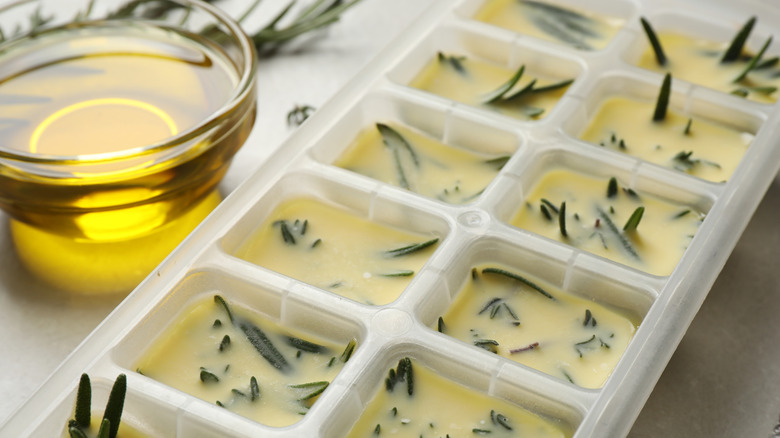Can You Freeze Olive Oil, And Should You?
Olive oil is among my favorite products; it's super versatile — you can use it for hair, skin, and, obviously, food. It's one of those staples that usually just sits out on your counter, but if you don't use it in a timely manner (especially the good stuff), it can go rancid. And once that happens, you'll taste it in your food. The flavor gets bitter or sour, the smell is strong and off-putting, and it definitely doesn't add that smooth, rich note you want from a robust olive oil. That's why some folks freeze it, especially in small portions. It's not about making it last forever, but it does give you a way to hold onto the quality if you're not burning through a bottle quickly.
Freezing olive oil isn't like freezing water, as it doesn't get rock solid. It thickens and turns cloudy when cold and eventually firms up like butter. You can use that to your advantage. One of the best ways to freeze it is by pouring it into an ice cube tray. Once frozen, pop the cubes into a freezer bag. That way, when you need a spoonful of oil to saute something or start a sauce, it's ready to go. It works well and keeps your olive oil from going to waste. Before freezing, you can also incorporate ingredients like fresh or dried herbs, garlic, chopped sun-dried tomatoes, or red pepper flakes to infuse the olive oil cubes.
The best way to store frozen olive oil
It is important to be aware of the difference between light and extra virgin olive oil. Extra virgin olive oil begins to solidify at higher temperatures because of the amount of polyphenols, waxes, and plant solids it contains. Light olive oil is more refined, with many of those compounds removed. When chilled or frozen, it remains liquid for longer and stays quite clear. As such, extra virgin olive oil tends to cloud and thicken faster, while light olive oil freezes more slowly and evenly.
There are a lot of creative ways to use an ice cube tray, and incidentally, they are perfect for freezing olive oil in individual servings. Just start out with a clean tray and measure out about a tablespoon per cube so you know exactly what you're working with when you grab one. Once the cubes are frozen, move them into a freezer-safe bag or container with a good seal, and make sure you label them with the date. That helps you know how long you have to use it up before the flavor drops off.
You can also freeze larger amounts in a small jar or freezer-safe container as long as you leave some space at the top since the oil will expand as it freezes. When you're ready to use it, let it thaw on the counter. Don't microwave it or heat it too fast, or you risk damaging the flavor. The best spot for storage is in the back of the freezer, where the temperature stays steady. Avoid the door since it warms up every time it is opened.
What freezing does (and doesn't) do to your olive oil
The idea of freezing olive oil might seem like it could mess with the texture or flavor, but it really doesn't. Olive oil is mostly fat, and since fat usually freezes slowly and uniformly, it tends to stay stable without separating too much or getting weird when it thaws. It comes back to life just fine, and you likely won't notice a change in the way it cooks or tastes. Even the color goes back to normal once it warms up to room temperature. That makes freezing a solid option if you're trying to save higher-end oils or just don't cook with it often enough to use a whole bottle in time.
Keep in mind that freezing doesn't make it stay fresh forever. Your best bet is to store it in the freezer for no longer than 18 months. Could you push it to two years? Sure, especially with more refined olive oils, but using it well before then ensures the best flavor. After a while, the taste or smell can definitely turn slightly funky as the quality of the oil deteriorates over time. However, the olive oil will stay safe to consume indefinitely as long as it remains continuously frozen.


